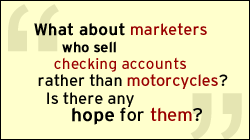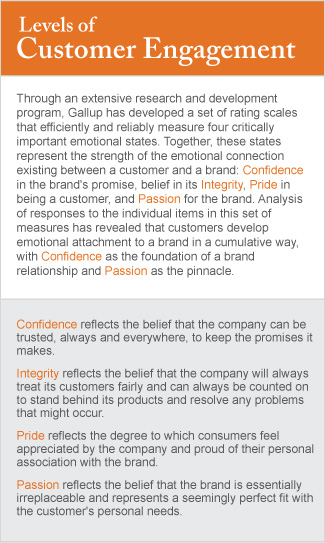It should come as no surprise that humans are emotional creatures. Even a casual glimpse into the nation's driveways, liquor cabinets, and cosmetics shelves reveals that consumers make buying decisions based in part on their feelings and emotions about particular brands. And marketers have long recognized the fact that emotions play a key role when consumers are talking about -- or purchasing -- products in categories as disparate as those represented by brands like Mercedes, Kodak, and Louis Vuitton.
Although none of this seems all that newsworthy, marketers appear to be rediscovering the power of human emotions, as evidenced by a raft of books and articles now in bookstores and on marketers' desks. Perhaps you've already read Passion Branding, Emotional Branding, The Culting of Brands, or Lovemarks. Or you may have noticed that the Journal of Advertising Research recently devoted an entire issue to studies of "Emotion in Advertising."
Suddenly, it seems that the new marketing millennium is all about emotions. And whatever has sparked this resurgence of interest, it's apparently contagious.
Emotional connections: links that last
Why all the interest? In part, it's because of the intensified focus on customer retention. To reap the enhanced financial benefits that can result from customer loyalty, marketers have enthusiastically pursued strategies intended to keep customers coming back. In fact, marketers want to move beyond customer "retention," which is merely a behavior, to generating customer "commitment," "delight," and even "evangelism" -- all of which represent enduring psychological bonds that link a customer to a company. (See "The Constant Customer," "Beyond Customer Loyalty," and "Customer Satisfaction Doesn't Count" in See Also.)
 |
In their books and articles, brand consultants have talked about consumer emotions and emotional connections. They've written about the passionately strong bonds that companies as varied as Harley-Davidson, Krispy Kreme, eBay, Starbucks, and Virgin have cultivated with their consumers. There are fascinating stories of brands that have intense customer loyalty that is the stuff of legend. They describe the sort of loyalty that, as marketers, we all covet.
But what about the marketer who is challenged to sell checking accounts rather than motorcycles? What about the brand managers who are tasked with pitching canned peaches, software, or home mortgages? Is there any hope for them? Or should they change jobs and join a company that sells, say, expensive watches, seeking a brand or product where a rich array of human emotions can come into play?
Many of the writers who focus on the brand new world of emotions have overlooked the mundane, favoring the highly visible "badge" brands that operate in "emotional" categories. Much of their writing and analysis seems to imply that emotions are something that your brand or product either inspires or it doesn't. Sports cars and perfume are emotional, while office supplies and household cleaners are not.
Whether or not its brand or product is viewed as "emotional," a company faces a major dilemma when it seeks to better understand how consumers connect with its brands. Emotions are treated as something that can be sensed but that otherwise defy scientific measurement. For example, Coca-Cola has "it" -- but we're never quite sure what "it" is. And too often, when measures of emotions are proposed or provided, they are complex and difficult to administer. They rely on strategies that are not always easy to replicate, like nonverbal photo sorts or deep psychological projective probing. More to the point, while these measures may correlate with consumers' stated intentions, they may fail to provide the sort of evidence that is demanded in the boardroom: How well do they link to actual, hard-number financial outcomes?
Psychologists have been studying human emotions for some time, and they've identified a number of them, ranging from "anger" to "disgust" and from "envy" to "love." But what are the emotions that a brand marketer should seek to embrace? What is the value of an emotional association? How on earth can a CEO tell when an emotional connection is present or when it's growing or intensifying -- and above all, why should he or she care?
In short, despite the interesting stories and intriguing case histories, all the books on emotional branding really haven't given much guidance to brand managers.
Cracking the emotional code
As mentioned in several Gallup Management Journal articles, Gallup has dug deeply into the nature of emotional relationships and how they can be reliably assessed and effectively managed. (See "Building a Brand Relationship," "Marketing's Missing Link," and "The Engagement Imperative" in See Also.) Gallup scientists have examined the role that emotions play in consumer decisions, and they have documented the impact of those emotions on a wide variety of hard-number business outcomes.
The following conclusions emerged from the findings of an extensive global R&D effort, along with the results of a number of company applications:
 |
- Emotional connections are not only the province of certain "emotional" categories or brands. Consumers are emotional about checking accounts and discount merchandise, not just about soft drinks and expensive fountain pens. Bank of America and Wal-Mart create emotional connections just as surely as JetBlue and iPod do. They do it in different ways -- depending far more on their people than on their products -- but the result is the same.
- Gallup surveys have shown that 11% of U.S. car owners are passionate about the car they own, but 13% are passionate about the place where they bank, and 12% are passionate about the mass merchant retailers where they shop. People aren't either "emotional" or "unemotional." Consumers are typically highly emotional about some brands and products while completely indifferent and "unattached" to others. Business customers are as emotional about their B2B purchases as car buyers, clothing shoppers, and resort visitors are about their selections.
- Consumers' emotional connections have a specific -- and fairly simple -- structure, regardless of the nature of the particular emotions involved. As revealed by Gallup's customer engagement metric, the structure begins at the foundation of the customer relationship with Confidence, then proceeds through Integrity to Pride to -- at the pinnacle of the relationship -- Passion about the service, product, or brand. (See sidebar: "Levels of Customer Engagement.")
- Emotional connections are not merely warm and fuzzy, nor are they simply interesting to contemplate and debate. They have powerful financial consequences, ranging from share-of-wallet to frequency and amount of repeat business. "Fully engaged" retail customers spend more and return more frequently than those who are disengaged. Retailers that have taken action to enhance their customer engagement by capitalizing on the engagement-building skills of their own customer-facing employees have seen double-digit increases in both sales and profit per square foot. Gallup has seen these results not just in the United States, but around the globe -- and we've seen them for banks, auto dealers, hardware stores, and business services marketers. Emotional connections are universally important, and managing those emotional bonds pays off handsomely.
- Some companies are very good at creating emotional connections with their customers. Most, however, are not. Companies that are successful at creating emotional connections benefit from stronger results, not only in cash flow and profit, but in market share.
- Emotional connections aren't static. They ebb and flow, and the results can affect a company's long-term business success. Emotional connections can be measured. They can be enhanced. And they can be managed. It's not easy, but it's demonstrably possible.
Thus, brand "passion" is not simply a topic that provides for interesting reading. And brand passion not an atypical emotional response -- something reserved only for atypical brands operating in atypical marketing environments. Emotional brand connections are, for any company that plans and hopes to compete, a business imperative.